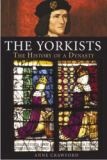The Yorkists
 Anne Crawford, The Yorkists. Hambledon Continuum, 2009. ISBN 978-1847251978
Anne Crawford, The Yorkists. Hambledon Continuum, 2009. ISBN 978-1847251978
This book provides a view of the four great family trees:
- The Yorkists and Lancastrians (including the Beauforts)
- The House of York with connections to the Staffords & Bourchiers
- The Woodvilles
- The Nevilles
All four genealogical tables are quite detailed and of importance in understanding the many and varied relationships involved in The Wars of The Roses. Unfortunately however, it doesn’t depict the close connection of the Percys of Northumberland and the Nevilles of Westmorland. Nor does it depict the close relationship between the Cliffords, the Percys and the Plantagenets of York. Perhaps because there was so many intertwining connections. For example, that relating to the descent of William Lord Hastings. His mother, Alice Comoys was a daughter of Elizabeth Mortimer, the widow of Hotspur and sister of Roger Mortimer Earl of March, whose daughter, Anne Mortimer, was the mother of Richard Plantagenet, 3rd Duke of York, and Isabel Plantagenet who married Henry Bouchier, the elder brother of Cardinal Thomas Bouchier, Archbishop of Canterbury.
Such connections show how dangerously close to the throne of Richard ll so many people were placed.
The Yorkists covers the early years of Richard, 3rd Duke of York (1411-1455) in a sympathetic and balanced way – attempting to honestly assess his strengths and weaknesses. It shows that he lacked the charisma of his eldest surviving son, Edward, Earl of March, and that his judgement and timing could often be badly flawed. He is shown as a sincere, honest man overtaken by events and stronger personalities.
Similarly, Cecily’s early years until her widowhood are treated fairly and fully. Her relationship with her daughter-in-law, Elizabeth Grey is shown to perfection – each being wary and resentful of the other’s position and influence.
Henry the VI is treated honestly and compassionately and an attempt to be fair to Margaret of Anjou is made in that it portrays her angst as the mother of a passed-over heir and her inability to see things from the English perspective. It also reveals how her desperation and distrust of Richard, Duke of York, encouraged and exploited by her favourites – Wiltshire and Sommerset – built up until it made of him an implacable foe.
The treatment of Edward IV if also commendable in that it shows him in all his strengths and weaknesses and judges him to have sown the Yorkist demise through his attitude of putting off so many problems and issues until they could no longer be avoided.
Crawford’s treatment of Elizabeth Grey is also very sympathetic and balanced – probably the best I have read – although she fails to accept the possibility of an attempt by Elizabeth and her faction to get Edward to London to an earlier coronation in an attempt to overcome the need for a Protector and Guardian. She is also dismissive of the Woodville’s plot to dispose of Richard and Buckingham en route to London; of the plight-troth; and of the guilt of Hastings and his cohorts. All of this, and more, she sees as Ricardian propaganda.
In dealing with Richard lll however, Crawford reveals a blind spot, and also a lack of awareness of family connections critical to her tale. She is unable to grant Richard lll as king, and earlier as Richard, Duke of Gloucester, the same unbiased, balanced and measured responses that she affords to others, including Edward’s courtiers and the roles they played, both overtly and covertly.
However, to be fair, she doesn’t lay the deaths of Henry VI, Anne and Edouard, Lancastrian Prince of Wales at his door. She does believe that the princes are dead – and during Richard’s reign – even whilst she admits that Henry Tudor can find no evidence to support the fact of their deaths or disappearance. To her, Titulus Regius is a fabrication that is only passed by a terrified Parliament who fear similar justice as that is metred out to William Lord Hastings if they fail to comply.
Crawford does not even consider that Hastings might have been guilty, nor does she accept the deaths of Vaughan, Grey and Rivers as inevitable. She makes no mention of the fact that the dying Rivers made Richard his executor, though she does accept that both Rivers and Grey could be cunning, ruthless and conniving politicians in their own interests and those of their families.
I thoroughly recommend this book to any who wish to read a fairly impartial (except where Richard is concerned) account of the Wars of the Roses, including the cause and the aftermath.
